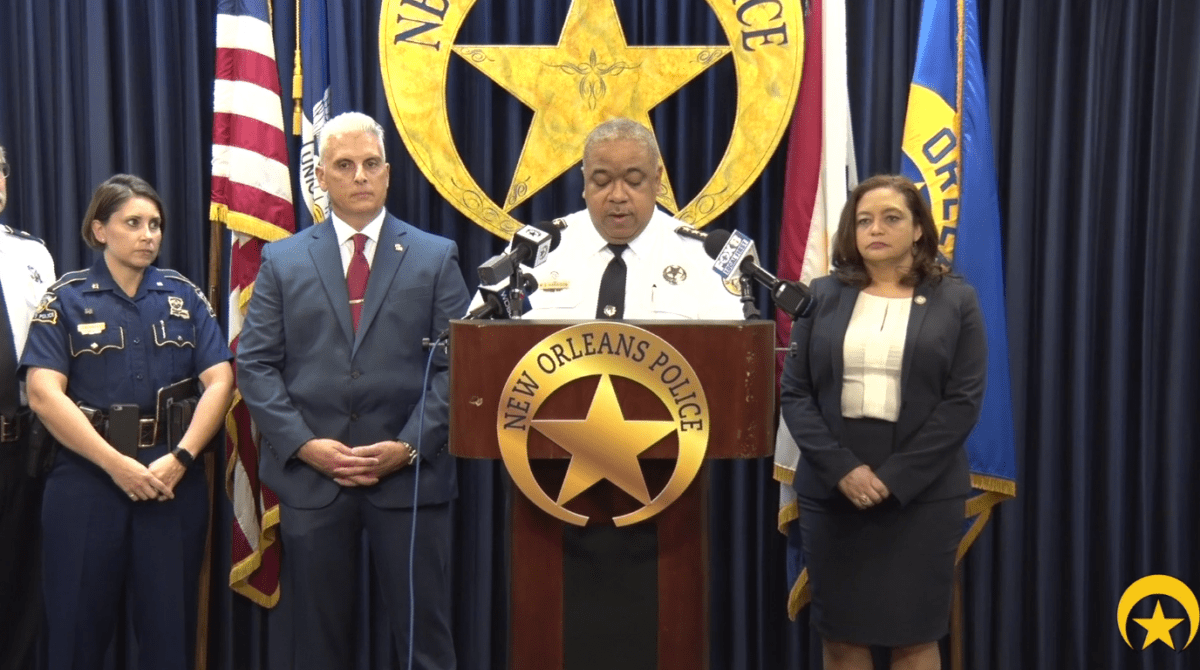In ‘Anti-Trafficking’ New Orleans Strip Club Raids, Police Make No Trafficking Arrests
The New Orleans Police Department, the Louisiana State Police, and the Louisiana Office of Alcohol and Tobacco Control (ATC) have raided eight French Quarter strip clubs in the past 10 days. At a Monday press conference, both NOPD and ATC claimed the raids were the result of a multi-month, ongoing “human trafficking” operation, yet they also admitted they made no trafficking arrests, nor did they identify any victims of trafficking.

The New Orleans Police Department, the Louisiana State Police, and the Louisiana Office of Alcohol and Tobacco Control (ATC) have raided eight French Quarter strip clubs in the past 10 days. At a Monday press conference, both NOPD and ATC claimed the raids were the result of a multi-month, ongoing “human trafficking” operation, yet they also admitted they made no trafficking arrests, nor did they identify any victims of trafficking.
Instead, what the ATC alleged occurred inside the French Quarter strip clubs was not trafficking, but 28 counts of violating an administrative statute that forbids liquor license holders from “permitting any prostitute to frequent the licensed premises or to solicit patrons for prostitution.”
Of the arrests, ATC Commissioner Juana Marine-Lombard said, “Prostitution in and of itself is sex trafficking.”
But prostitution is not trafficking. Trafficking, as it is defined by the state of Louisiana and under federal law, requires force, fraud, and coercion; prostitution does not. In the same press conference, New Orleans Police Department Superintendent Michael Harrison admitted that he does not believe prostitution and sex trafficking “are one and the same.”
The raids on French Quarter strip clubs come after a multi-year campaign, led by youth homeless services agency Covenant House New Orleans, to link stripping with sex trafficking, an effort also backed by state and city lawmakers. During the recent raids, undercover agents entered the clubs, and according to ATC’s notices of license suspension, “observed a dancer known as [redacted by IJT] fully exposed [sic] her breast [and] vagina.” At another club, undercover agents said three different dancers “did touch, caress, or fondle [the undercover agent’s] genitals while employed at licensed premises.” Such conduct however, is not evidence of trafficking.
As a result of the raids, ATC suspended eight clubs’ alcohol and tobacco licenses, leading establishments such as Rick’s Cabaret and Rick’s Sporting Saloon, which have a common owner, to close their doors until their licenses are restored. Robert and Chloe Watters, the owners of those clubs, told The Appeal that they have 150 employees and more than 1,000 contract workers across both clubs.
Lyn Archer, an organizer with Bourbon Alliance of Responsible Entertainers (BARE), a group led by local dancers, slammed the raids. “We question the real motives behind such an effort,” she says, “and the lack of cohesion between departments, who each defined both ‘prostitution’ and ‘trafficking’ differently.”
At the press conference, NOPD Superintendent Harrison said the undercover investigations and raids were meant to be a “first step” to “end human trafficking.” And ATC Commissioner Marine-Lombard said, “We have no issues with the dancers.” But Penthouse Club dancer Devin Ladner tells In Justice Today that’s not how it feels for women working at the few clubs still operating in the city. “It’s a complete mess of paranoia,” she says. “Every single girl is paranoid and worried.” Even though the Penthouse Club was not raided, Ladner says, “I have never felt scared to go to work before … now I feel terrified.”
Another woman, who was working at Rick’s Saloon during the raid, provided a statement to BARE, later shared with In Justice Today. “In all honesty, it [was] the most degrading experience of my adult life, and I’m a dancer,” she wrote. “After it was over, I witnessed women weeping until they vomited. We gathered together and held each other after the raid, as some were profoundly shaken by the events of the evening.”
NOPD Superintendent Harrison said his agency’s mission was to protect women victimized by human trafficking — though the raids failed to identify any — but dancers say it was his department’s raid that victimized women. That’s certainly how the dancer at Rick’s Saloon during the raid described it to BARE. “To have grown men watch me dress and undress without my consent,” she wrote, “to photograph me half-naked on their personal cell phones, to laugh in our faces as we wept, and to corral us, like cattle, in areas with no cameras present is completely dehumanizing.”
Lyn Archer of BARE considers the approach dangerously misguided. “The raids have led to zero arrests of pimps, and zero instances of violence against women, other than those perpetuated by their own officers,” she says. “Bourbon Street workers could offer critical and sensitive information and help to uncover and stop violence, if only law enforcement could foster trust by demonstrating they are capable of treating us with respect.”
